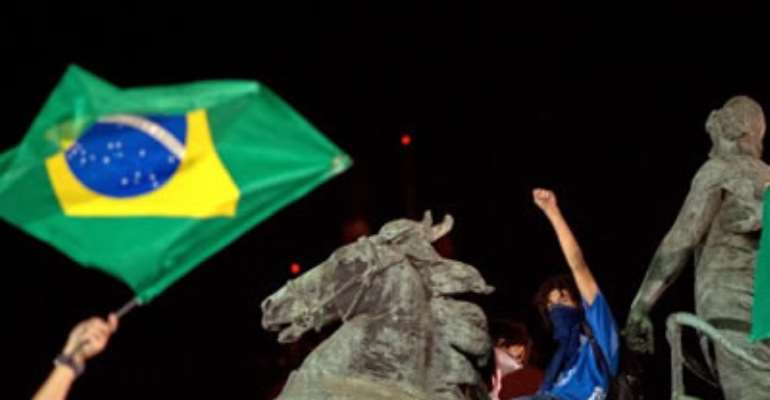Rousseff Proposes Referendum For Brazil Political Reforms

In the wake of massive anti-government protests, Brazilian President Dilma Rousseff proposed a referendum as a way to place political reform in the public's hands.
The past weeks have seen the biggest demonstrations in decades, with tens of thousands taking to the streets in cities across the country.
The protests started with outrage over a public transportation fare hike, but quickly ballooned to encompass a number of grievances against the government.
Rousseff on Monday responded directly to some of the protesters' demands, outlining five "pacts" on social issues.
Among those was a proposal for a referendum "to make the political reforms that the country needs," she said.
The message the government is hearing from protesters is that they want more change faster, Rousseff said.
"The streets are telling us that the country wants quality public services; that they want more efficient mechanisms to fight corruption that ensure the proper use of public money; that they want political representation that permeates a society where, as I said before, citizenship -- and not economic power -- is put first and foremost," she said.
She spoke at a meeting with governors and mayors.
Her other recommendations:
-- Fiscal responsibility with an emphasis on inflation control and economic stability.
-- Acceleration of investment in health care, including money for hospitals and health clinics, incentives for doctors to practice in needy areas, and the hiring of foreign doctors where shortages exist.
-- Public transportation improvements to the tune of 50 billion reals (U.S. $22 billion), new infrastructure, and a national council on transportation.
-- Boost public education by asking Congress to set aside 100% of oil revenues for schools.
These proposals align with the most common refrains heard during the protests -- that money is squandered instead of being used to improve the situation of Brazilians.
"Together with the people we can solve large problems," Rousseff said. "There is no reason to be inert, complacent or divided."
Many state governments had already reversed the fare hikes that had spurred the protests, but doing so did not slow the protests.
The president has supported the protests as an expression of free speech, but has warned against the sporadic acts of looting and violence that have been recorded.
On Monday, Rousseff met with representatives of the Free Fare Movement from Sao Paulo. It was her first meeting with protest leaders.
CNN
